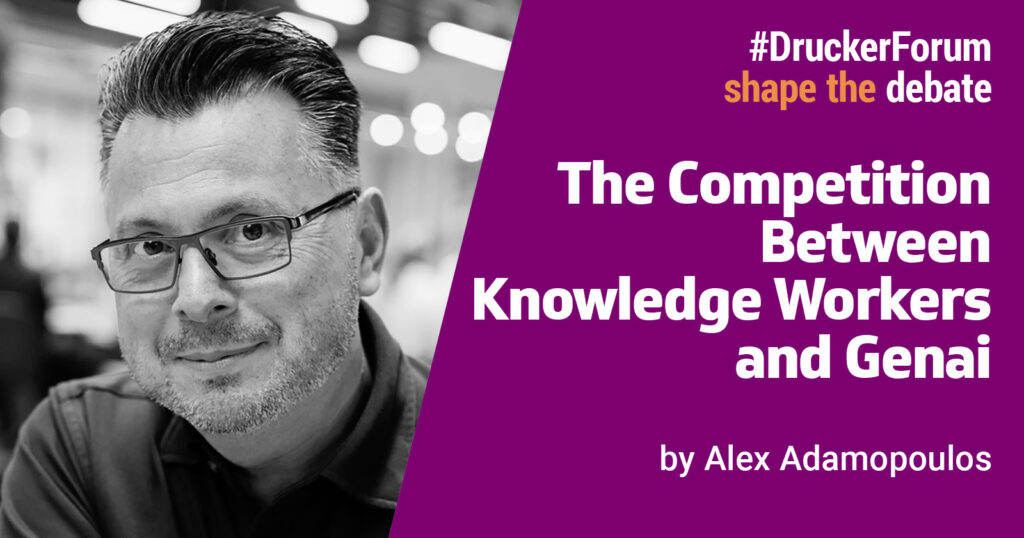
I just came back from attending one of the world’s largest technology conferences where the sarcastic comment of the week from speakers was to promise they wouldn’t bring up the term ‘AI’. We have a huge problem looming that’s related to AI. It’s already become a confusing buzzword that most can’t define or explain. When asked, the common response is that AI is ChatGPT or another GenAI tool. This lack of clarity and confusion about AI is compounded by the AI fearmongering that exists in the media and within organizations that want everyone to believe we’re all going to be replaced by robots or a bot. There’s also a perception of division between the knowledge worker (people) and the AI (the tools).
Even the Tesla Optimus robot needed human assistance when it was revealed, although, admittedly, it’s very cool. AI is still about GenAI tools for many – automating research, brainstorming, report building, repetitive tasks, and some cool new advancements like converting documents into two-person podcasts or songs. Even though there are some excellent use cases that go way beyond the common GenAI toolsets many of our organizations have been part of, there is a continued lack of definition when it comes to the category.
AI is many things, but it’s not yet a replacement for knowledge workers. The reality is that much of the core knowledge in many companies exists inside the minds of key individuals who have shaped that company’s work. Unfortunately, it’s not always written down or published. Not every important detail, nuance, or quick fix is accounted for in some data source. Yet, let’s recall Drucker’s view: “Knowledge has to be improved, challenged and increased constantly, or it vanishes.”
Both preexisting knowledge and newly gathered insights are essential for accessing and effectively using accurate data where governance and relevant regulations and ethics are in place. From the company’s viewpoint, the emphasis should be on collaborating effectively rather than merely “competing” with GenAI tools. Knowledge-intensive organizations (KIOs) and Knowledge Workers (KWs) have a distinct advantage in utilizing GenAI as long as they adopt a strategic and pragmatic approach to these powerful tools.
One of the many mantras I share is the idea of slowing down to go faster. It definitely applies here. There is some critical thinking we can apply to be successful with a governing AI strategy and also in embedding AI tools inside our organizations alongside our knowledge workers.
A Blueprint for GenAI Integration:
Here’s how to elevate the role of GenAI from a mere tool to a true collaborator for knowledge workers. Instead of replacing human experience, let’s amplify it, strategically leveraging GenAI to empower higher-order thinking and drive competitive advantage.
Don’t Replace Human Experience, Augment It:
- Focus on areas where GenAI shines: Employ GenAI for drafting reports, summarizing research, brainstorming ideas, and automating repetitive tasks. This allows human experts time to engage in higher-level thinking, strategy, and complex problem-solving that necessitates nuanced judgment and experience.
- Acknowledge the limitations of GenAI: Be aware that GenAI may occasionally produce incorrect or biased information. KIOs should leverage their expertise to assess outputs critically, maintaining quality and accuracy.
Embrace a Data-Focused Methodology:
- Curate quality data: GenAI models heavily rely on the data used for training. KIOs must prioritize data management, ensuring accuracy, relevance, and representativeness.
- Customize models with proprietary data: This allows KIOs to develop unique, specialized AI solutions tailored to their specific needs and knowledge domains.
Emphasize Human-Centered AI:
- Create AI solutions that support human workflows: Smoothly incorporate GenAI tools into current processes to improve productivity and efficiency.
- Emphasize clarity and openness: To build trust and acceptance, ensure that AI-generated results are comprehensible and interpretable by human users.
Prioritize Training and Development:
- Embed capabilities and skills that accelerate AI adoption: Equip employees with ongoing learning, focusing on product management, agility, leadership, and change management skills to facilitate smoother AI integration.
- Enhance employee skills for GenAI: Offer training on effective tool usage, result interpretation, and bias mitigation.
- Cultivate a collaborative culture between humans and AI: Motivate employees to see GenAI as an ally rather than a competitor.
Lead with Ethical Guidelines:
- Establish clear ethical AI standards: Confirm that GenAI is utilized responsibly, tackling possible biases and societal effects.
- Ensure human supervision: Establish measures to thwart misuse and align AI systems with the organization’s values.
By following these principles, KIOs can leverage GenAI not as a replacement but as a partner – enhancing organizational strengths, unlocking new opportunities, and gaining a competitive edge in the AI era. This strategic integration equips organizations to thrive in an evolving landscape and ensures their workforce is future-ready and prepared to navigate an unpredictable environment with confidence and resilience.
About the author:
Alex Adamopoulos is Chairman and CEO of Emergn Ltd.
Sign up to view the full eBook, Creating Performance that Matters in the Workplace, at emergn.com/drucker-performance
Alex will be at the Global Peter Drucker Forum on the Opening Salvo: Radical (but Practical) Ideas for Advancing Knowledge Work
In this high-energy opening plenary, top speakers and executives will in rapid succession put forth bold assertions about knowledge-intensive organizations and how they must change. Which claims deserve more focus over the next two days? You get to decide. A panel will discuss the implications.

